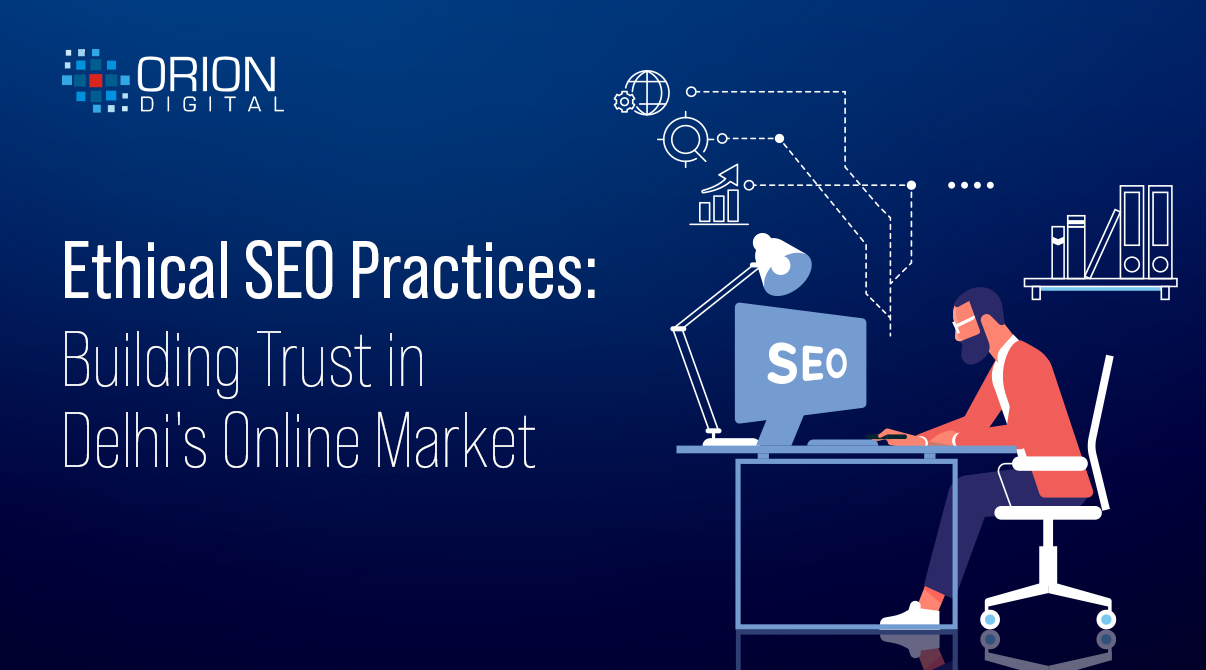
Ethical SEO Practices: Building Trust in Delhi’s Online Market
- admin
- September 29, 2023
- SEO, Digital Marketing
- Digital Marketing, ORM, SEO
- 0 Comments
Delhi is the heart of India that pulsates with energy and ambition. As businesses in this vibrant metropolis embrace the digital age, the role of SEO (Search Engine Optimization) in shaping their online presence becomes increasingly crucial. However, not all SEO practices are created equal. To truly succeed in Delhi’s competitive online market, businesses must adopt ethical SEO practices that prioritize transparency, quality, and trust-building. In this comprehensive guide, we will explore the significance of ethical SEO, shed light on unethical practices to avoid, and provide actionable insights on how to build trust through ethical SEO in Delhi’s dynamic online landscape.
The Essence of Ethical SEO
Before we delve into the strategies that can help build trust, let’s clarify what ethical SEO truly means. Ethical SEO, often referred to as “white-hat SEO,” is an approach to optimizing websites that aligns with search engine guidelines and focuses on the long-term, sustainable growth of a brand’s online presence. Ethical SEO practitioners prioritize user experience, quality content, and genuine engagement over quick fixes and manipulative tactics.
Unearthing the Trust Deficit
Delhi’s online market is a thriving ecosystem where businesses from diverse industries vie for the attention of a technically educated audience. Amid this intense competition, it’s not uncommon for some to resort to unethical SEO practices, including:
1. Keyword Stuffing:
Unethical SEO practitioners may stuff web pages with excessive keywords, making the content unreadable and harming user experience.
2. Duplicate Content:
Plagiarized or duplicated content not only damages the credibility of a website but can also lead to severe penalties from search engines.
3. Paid Links:
Purchasing links from low-quality or spammy websites to boost rankings is a black-hat tactic that can result in search engine penalties.
4. Cloaking:
Some unethical SEOs use cloaking techniques to deceive search engines by showing different content to users and crawlers.
5. Hidden Text and Links:
Hiding text or links within a web page, often with the same colour as the background, is another deceptive practice that violates search engine guidelines.
Building Trust through Ethical SEO
To gain a competitive edge in Delhi’s online market, businesses must embrace ethical SEO practices that prioritize trust-building. Here’s how it’s done:
1. Quality Content Creation
Ethical SEO begins with the creation of high-quality, relevant content that provides value to users. Businesses in Delhi should invest in well-researched, informative, and engaging content that addresses the needs and interests of their target audience. Content marketing strategies, such as blogging, video marketing, and infographics, can help establish thought leadership and build trust.
2. User-Centric Optimization
Prioritize the user experience. Ensure your website is fast-loading, mobile-responsive, and easy to navigate. Clear and intuitive site architecture, well-structured URLs, and descriptive meta tags contribute to a positive user experience. Remember, happy users are more likely to become loyal customers.
3. Transparency in link-building
Link building is an integral part of SEO, but it should be done transparently and organically. Avoid paid links and focus on earning high-quality, relevant backlinks through guest posting, content partnerships, and influencer outreach. Ensure that all links add value to the user and are not deceptive in any way.
4. Social Proof and Reviews
Encourage customers to leave honest reviews and testimonials. Positive reviews build trust and credibility. Respond to both positive and negative feedback professionally and promptly. Use structured data to display review ratings in search engine results, enhancing your online reputation.
5. Local SEO Optimization
For businesses operating in Delhi, local SEO is essential. Optimize your Google My Business profile, provide accurate business information, and encourage customer reviews. Local SEO helps your business appear in local searches and on Google Maps, improving your visibility to potential customers.
6. Regular SEO Audits and Updates
Continuously monitor your website’s performance through SEO audits. Identify and fix any technical issues, broken links, or outdated content. Staying up-to-date with search engine algorithm changes and SEO best practices is crucial for long-term success.
7. Educate and Empower
Educate your team about ethical SEO practices and the importance of building trust with customers. Ensure everyone is aligned with the brand’s commitment to ethical SEO. Empower your customers with valuable information through blogs, guides, and FAQs, establishing your brand as a trusted resource.
Conclusion
In Delhi’s bustling online marketplace, ethical SEO practices are not just a choice; they are a necessity for building trust and sustaining long-term success. By prioritizing quality content, user-centric optimization, transparent link building, and proactive reputation management, businesses can establish themselves as trusted entities in the digital realm. The tech-savvy consumers of Delhi are not only seeking products or services; they are seeking trust, reliability, authenticity and experience. Ethical SEO is the beacon that guides businesses toward earning and maintaining that trust, ensuring a bright and prosperous future in the dynamic landscape of Delhi’s online market.
Summary
- Ethical SEO practice is not just a choice but a need to build trust with your consumer base
- SEO is needed to survive in this digital-first world that we are moving towards
- Local SEO has to be optimised per the local audience
- Staying away from illicit practices will not invite unwanted bans and restrictions for your business




